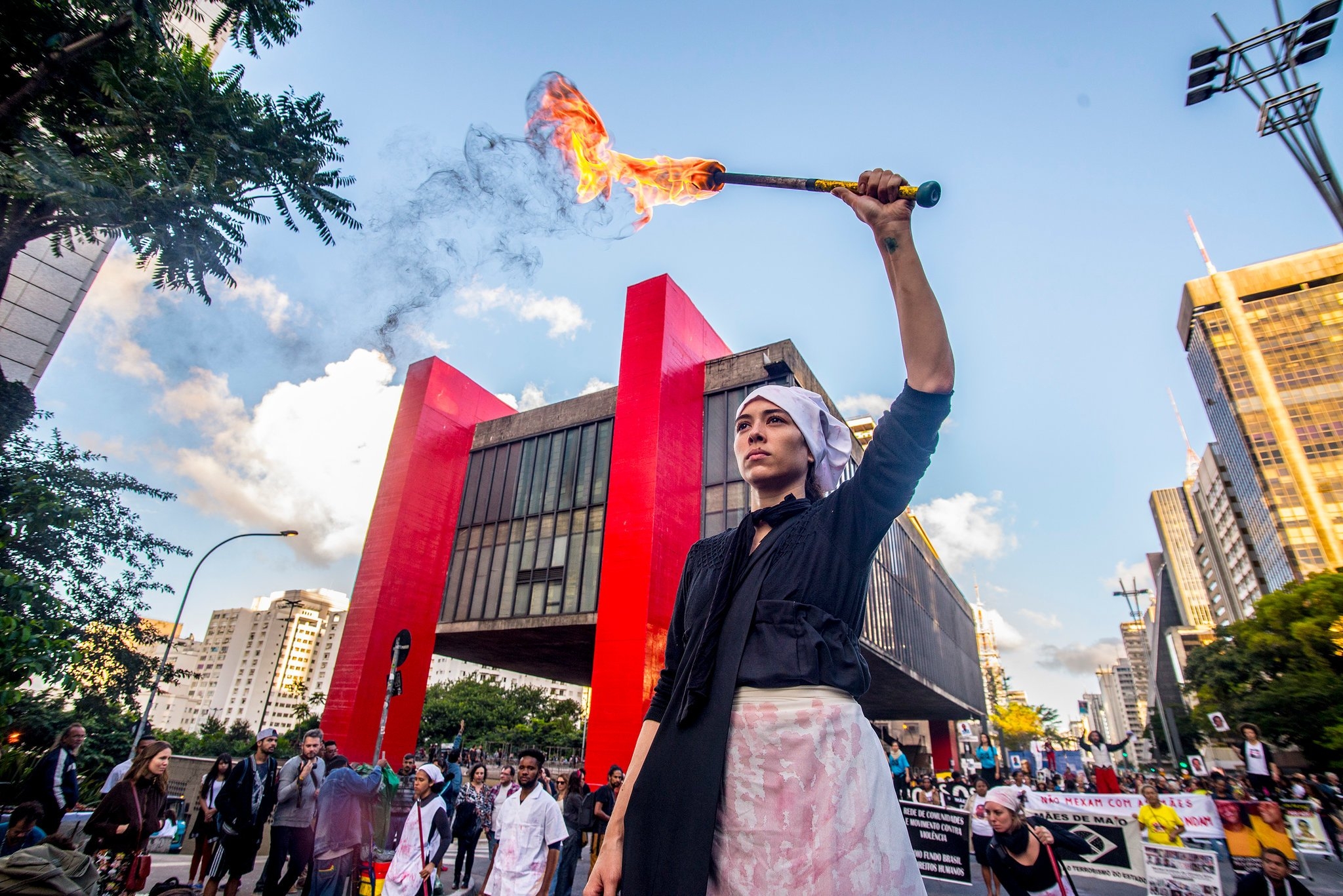
Mães de Maio members demonstrating in São Paulo, Brazil in April. Credit: Cris Faga/NurPhoto, via Getty Images
The New York Times – Sunday Review
December 28, 2017
by Vanessa Barbara
Contributing Op-Ed Writer
SÃO PAULO, Brazil — It was not the best year for many of us. My country, for example, seemed to walk proudly backward through 2017, and the coming year promises fewer rights and even more inequality. Brazil is regressing so quickly that I can almost see on the horizon a fleet of Portuguese caravels coming to colonize us all over again.
A few recent setbacks worth mentioning: I lost my primary job a while ago and many of my friends are unemployed. The bus fare is probably going to rise again. Yellow fever is once more a looming threat. People are cooking with wood because they can’t afford gas. Brazil remains a leader in income inequality. Our homicide rates are still astronomical (with the majority of victims being poor and black). And the season for good tangerines is over.
So two months ago, when I found out I was pregnant, I knew exactly what kind of parent I was destined to become: a tenacious, angry mother carrying on a proud Latin American tradition. Something between Argentina’s famous Madres de Plaza de Mayo (who are called “las locas” because the government has branded them as crazy) and Brazil’s Mães de Maio (who are regarded by some as prostitutes, drug traffickers and defenders of criminals).
I want to take as models not those mothers who spend all their energy obsessing over decorating a nursery but those who cradle a baby with one arm and try to overthrow an illegitimate government with the other.
Mães de Maio is a group of activist women created after the police killed some 500 civilians throughout São Paulo State over a few days in May 2006. That mass killing was retaliation for the deaths of dozens of state officials (mainly police officers) in attacks coordinated by a criminal gang. According to a study by the International Human Rights Clinic at Harvard Law School and the Brazilian nongovernmental organization Justiça Global, at least 122 of the civilian deaths bore the marks of extrajudicial execution. Nearly all of these cases were closed without indictments.
More than 10 years later, Mães de Maio is still pushing to have the investigations of these deaths transferred from São Paulo State to federal authorities. But the group is interested in something more: Its mission, it says, is “to fight for truth, memory and justice” not just for its own families but for all oppressed Brazilians. Since 2006, mothers of other people killed by the police have joined Mães de Maio; the group also lends support to other causes, including those of poor and indigenous people, feminists, civil rights activists and public school students.
Mães de Maio was inspired by its Argentine sister, Madres de Plaza de Mayo, which has spent the past four decades pressing its government for information on the whereabouts of the children who disappeared under the military dictatorship that ruled Argentina from 1976 until 1983. Every Thursday, Las Madres circle a main square in Buenos Aires, reciting the names of some of the estimated 30,000 people detained, kidnapped and killed in that period. Many of them carry photographs of their loved ones. The ritual is both sad and moving.
Members of both the Argentine and Brazilian groups have been threatened, harassed and even killed for their activism. One of the mothers said that the police officer who killed her grandson has threatened to send her to jail for drug trafficking.
“But I don’t have any fear,” said Débora Maria da Silva, one of the founders of Mães de Maio. “After all, I don’t have anything else to lose: My son was my greatest treasure.” Ms. Silva also says she doesn’t feel intimidated by the police because she is, indeed, an authority. Mothers have certainly occupied an authoritative position in Latin America since Iberian colonization.
During a visit to Mexico in 1979, Pope John Paul II, speaking at the Basilica of Our Lady of Zapopán, declared that faith and devotion to the Virgin Mary are part of the identity of Latin America, “the true expression of the soul of a people.” It’s true that across the region we venerate the mother of Jesus. (Brazil’s most popular shrine is dedicated to Our Lady of Aparecida, our country’s patroness.)
Maybe we admire her relentless hope in the face of atrocity, her faith in moments of grief, her resilience and, especially, her idea of motherhood not as a celebration of herself or even of her son — who, by the way, was also the son of God, so no one would have blamed her — but as an authentic commitment to others. And like the Mães de Maio, she struggles in the name of the children of other women, especially the poorest and the neediest.
Mary is also a model, the pope said, “for those who do not accept passively the adverse circumstances of personal and social life.” And as if it weren’t enough, she “promotes justice, liberates the needy, but, above all, bears witness to that active love which constructs Christ in souls.”
With the blessing of Our Lady of Aparecida, I hope this pregnancy leads to a good, angry, disobedient mother. It might not leave much time for baby showers, but I prefer it that way.
Vanessa Barbara, a contributing opinion writer, is the editor of the literary website A Hortaliça, and the author of two novels and two nonfiction books in Portuguese.
A version of this op-ed appears in print on December 31, 2017, on Page SR9 of the New York edition with the headline: I Want to Be an Angry Mother.

